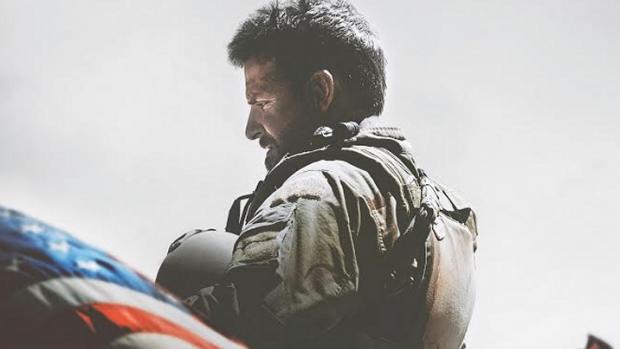American Sniper, may have smashed box office records, but it suffers from a lack of depth
Director: Clint Eastwood
Cast: Bradley Cooper, Elise Robinson
Rating: 15
Running time: 132 mins
Release date: 16th of January 2015
AMERICAN SNIPER is a timely biopic. It is Clint Eastwood’s hymn to the sacrosanct emblem of the gun, a cornerstone of the United State’s protean culture. Americans have grown tired and sheepish of an aggressive foreign policy. The Middle-East is where tribal war reigns when hard dictators fall, not a fertile ground for ‘freedom’ and ‘democracy’. The US project has failed – leaving a chasm in a film where the din of US jingoism would normally burst forth. While the mystique of the expert gunman remains, AMERICAN SNIPER lacks the confidence of a nation in transition.
Eastwood wastes no time in his nostalgic pandering, however. A roof-top sniper, Chris Kyle (Bradley Cooper), the protagonist of the film, has an extended flashback. The audience is transported to his youth, filled with rodeos, the omnipresence of the gun, and denim; lots of denim. Most tellingly Kyle recalls his stern, patriarchal father recounting the story of the sheep (the vulnerable and ignorant), the wolf (the ‘other’), and the sheep dog (the upholder of justice). Eastwood is clearly mourning the assured role of world arbitrator that the US made its own. The sheep represents the opposition to Eastwood’s neo conservative philosophy – they are blind to the distinction between friend and foe, much like the hippies his Dirty Harry character despised.
The film’s narrative structure is split into Kyle’s Iraq tours, interlinked with his progressively strained relationship and home life. After a tour brimming with death and destruction, his wife notices the toll on his psyche as he alienates her. The dynamic between Chris and Debbie Kyle (played by Elise Robinson) is realistic and a highlight throughout. Cooper and Robinson are capable actors, contributing to the much needed emotional depth, but an Oscar nod, for Cooper, is criminal given the omission of actors like Jake Gyllenhaal (NIGHTCRAWLER).
There is no doubting Eastwood’s skill in handling the action scenes during the tour segments. He has a steely eye for cinematic scale, avoiding the frenetic editing and claustrophobic close ups that plague many modern war films. Eschewing this supposed realism, Eastwood succeeds in directing coherent action sequences of acute clarity. Overhead shots are emphasized, with the sniper ‘s perspective being a key camera position. Scenes are never ruined by blitz shot pacing, with the director settling for a conservative, documentary- style of fixed camera shots. The bullet effects are notably impressive, adding to the heady sense of danger Kyle is caught up in.
In the closing scenes, Eastwood idolisation of the gun reaches absurd reverence. Beyond signifying the holiness of constitutional amendments, the rugged individualism of the Wild West and so on – the gun, for Eastwood, takes on a positively phallic role. In a scene where Kyle enters his kitchen while aiming a gun at his wife, it turns out to be a peculiar joke-cum-act of foreplay. The scene’s ridiculousness is compounded by the fact that Elise is clearly – and worriedly – aware of Kyle’s post-war stress syndrome, and yet she takes it as a cue to get frisky.
Eastwood’s partisanship reaches critical mass when, shockingly, he avoids a scene in which the film’s sole, ironic twist takes place. This demonstrates cowardice on Eastwood’s part and signals that the debate over gun fetishisation hasn’t reached the end of its shelf life just yet.
Overall, AMERICAN SNIPER is a decent if unremarkable film, garnering two Oscar nominations due to its patriotic themes. To its credit, it’s not entirely jingoistic. There is pained admittance of consolidation here, as the US undergoes a self-reflective phase. Ultimately, though, it suffers from a lack of depth, with its most poignant twist being reduced to one sentence fading into the end credits.
Verdict





























